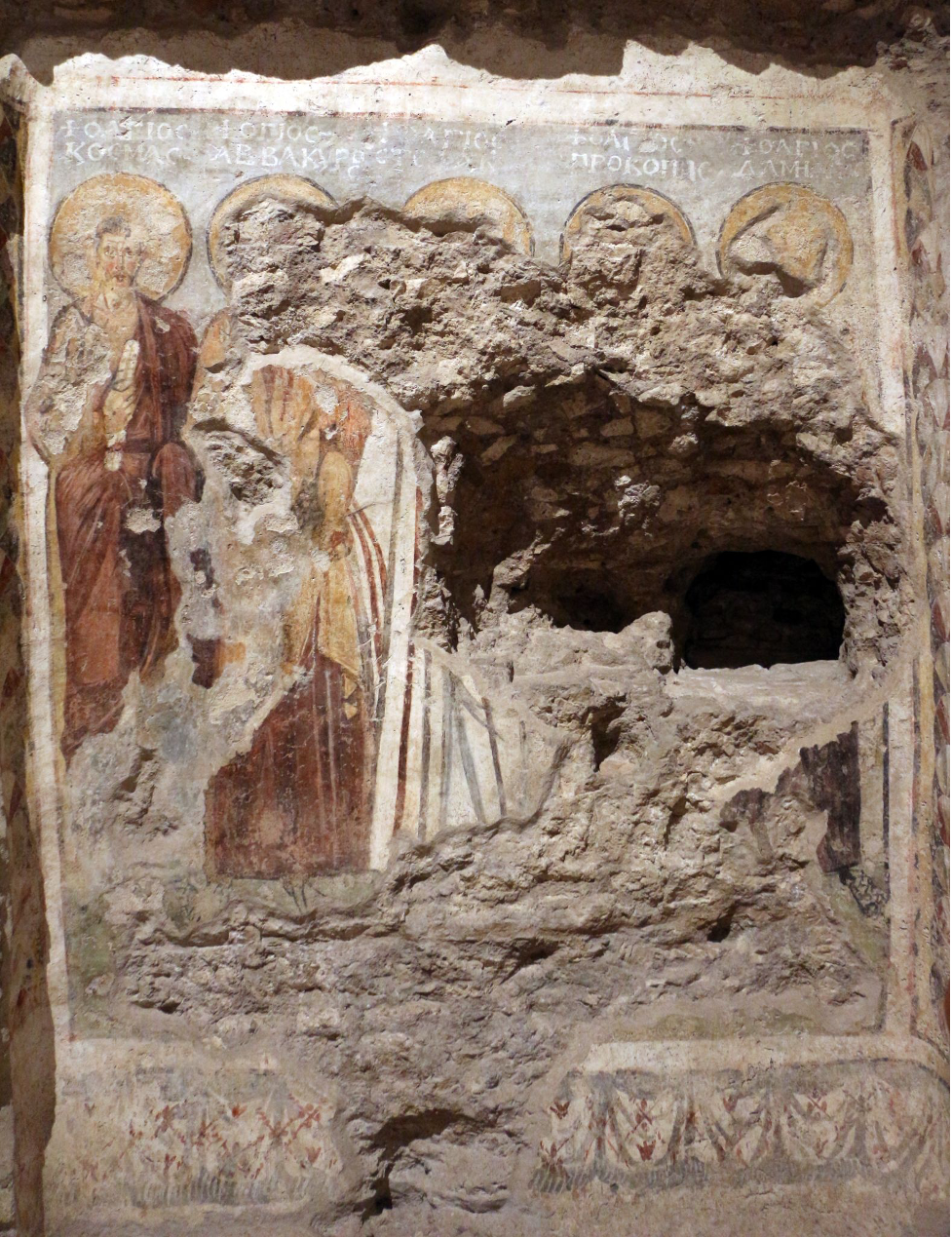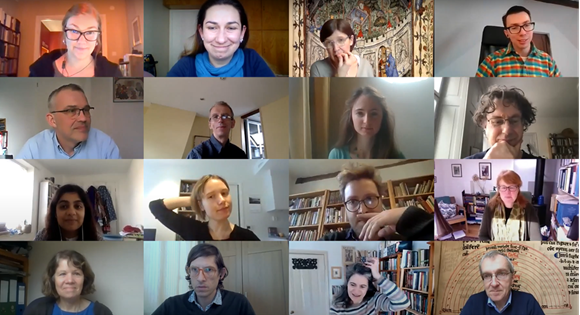
Constructive Absences in Medieval Literature: A Transformations & Translocations Workshop
Divna Manolova and Julian Yolles write about the Transformations & Translocations workshop which took place online on February 25-26, 2021.
25-26 February 2021
Organizers: Divna Manolova, Elizabeth Tyler, Julian Yolles, and Rosa M. Rodríguez Porto
This experimental online workshop moved from previousTransformations and Translocations workshops and conferences on forms to examine the question of the absence of forms and of absence as form. We invited participants to reflect critically on the methodological problems, implications, and above all, opportunities of absence and related concepts of discontinuity and fragmentation. How can we make the evidentiary gaps inherent in our field productive and meaningful? What insights can we gain from focusing on the lacuna as a structuring form? In other words, how did absence shape the sources we have? By situating absence at the centre of our discussion, this workshop aimed to engender fruitful new ways of thinking about the incomplete record at our disposal as medievalists.
Spurred by a discussion of spolia and ‘spoliability’ that took place at the symposium on Moving Forms: The Transformations and Translocations of Medieval Literature (Athens 2019), we started considering not just the things that were dislocated and brought into different contexts, but also the gaps they left behind as a meaningful subject of investigation. We began to think of these absences as forms themselves that impacted the world around them, and to think of such gaps as not only a methodological challenge but also an opportunity. Of course, we medievalists are not the only ones to encounter absences; therefore, one of the central questions we posed during this workshop is: what can medievalists specifically contribute to thinking about absence?
For this workshop, we adopted an experimental format: whereas previous T&T workshops and conferences all involved prepared presentations of some kind, we deliberately departed from tradition. We gathered scholars within distinctive fields of medieval literature - ranging from Arabic to Irish, Byzantine to Hebrew, and many others - to discuss a set of pre-circulated readings and to present to the group an idea for a scholarly publication on the workshop topic that arose organically from the discussions. The workshop participants included Annabel Dukes (CML, University of York), Christian Høgel (CML, University of Southern Denmark), Divna Manolova (CML, University of York), Elizabeth Tyler (CML, University of York), George Younge (CML, University of York), Ingela Nilsson (Swedish Research Institute in Istanbul, Uppsala University), Jane Gilbert (University College London), Julia Verkholantsev (University of Pennsylvania), Julian Yolles (CML, University of Southern Denmark), Konrad Hirschler (Freie Universität Berlin), Máire Ni Mhaonaigh (University of Cambridge), Rosa M. Rodríguez Porto (Universidade de Santiago de Compostela, CML), Shazia Jagot (University of York, CML), Synnøve Myking (University of Bergen), Tom McLeish (University of York, CML), Uri Shachar (Ben Gurion University of the Negev), and Wim Verbaal (Ghent University).

Day 1: Reflecting on the Past
We began with taking stock of the previous two events organised within the T&T strand (York 2018 and Athens 2019) and the special workshop in collaboration with Ghent University dedicated to the Liber Floridus (Ghent 2019). In this first section, we asked those who participated in previous events of the T&T strand to think back to the readings, presentations, and discussions they were involved in and to summarize their salient findings. Our aim was twofold: to consolidate previous insights and to introduce participants new to CML to T&T and to the existing conversation.
The first day continued with a joint discussion of three pre-circulated readings. We asked the participants to reflect on how their work and field relates to the readings, to explore the methodological issues and opportunities opened up by absences, and to relate the theoretical principles exploited in the readings to concrete examples from works on medieval literature and from their own research.
Day 2: Abstracts
While the first day focussed on consolidating existing ideas, the second day revolved around breaking new ground and creatively engaging with the workshop theme. We started by summarizing the main issues arising from the Day 1 discussions.
Having listed a number of possible distinctions between different types of absences (e.g., intentional and unintentional; significant and hidden; imagined and curated), as a group we felt strongly that our first task should be to think and speak about absence as a form with a higher level of precision. Second, we acknowledged absence as a useful tool for discussing agency as well as authority and as a framework that encouraged us to be aware of the paradigms (intellectual, cultural, scholarly) we are working in and thinking from. We reiterated some of our leading research directions, namely the inquiry into the medievalists’ contribution to the study of absence and the examination of the ways in which it relates to the materiality of our evidence and to its modes of survival and loss.
Finally, we also encouraged the participants to share their experience, thoughts and reflections from the first workshop day. As a result, several additional themes emerged, ranging from the need to distinguish between the processes of spoliation and fragmentation and the interpretation of absences, losses and gaps, on the one hand, to a discussion of medieval conceptualizations of and attitudes toward the void, on the other. We asked ourselves whether the absence of surviving documentation which we usually perceive as a loss for scholarship is similarly understood as a loss by medieval societies. Further, we wondered what different attitudes there are towards absence, loss and the void beyond Western culture. Finally, we also thought about the role played by fiction in embracing the void and the role of imagination when predicated on absence. With such ideas on our minds, we continued with the final workshop sessions, in which we invited the participants to present a work-in-progress abstract of their prospective written contributions. Importantly, none of the abstracts were written in advance and they were the product of two days of reading, thinking and conversing together.
The first round of abstracts included presentations by Konrad Hirschler, Máire Ni Mhaonaigh, Julia Verkholantsev, Uri Schachar, Wim Verbaal, Ingela Nilsson, Jane Gilbert, and George Younge. The presentations critically examined such diverse topics as Levantine archival practices, creative absence in Irish narrative, absences of historical narrative in Central and Eastern Europe, absence and desire in medieval Latin (epistolary) literature, the “completeness” and “incompleteness” of narratives across culturally defined “story worlds,” exile and poetic (self-)effacement in late medieval French poetry, and erasure and suppression of uncomfortable narrative elements in twelfth-century English hagiography. Several central topics emerged organically from these presentations and accompanying discussions. For instance, the notion of “perceived absence” and the importance of interrogating the subjectivity of absence: are the absences we identify ones that were experienced as such in the medieval past? How was absence perceived differently by medieval authors, scribes, and readers in various cultural settings? The concept of “desired absences” also led to fruitful discussion: how can we examine absences that were created by design, and what conceptual and methodological tools do we need to do so—in other words, do we need a “philology of absence”?
The final session included abstract presentations by Annabel Dukes, Elizabeth Tyler and Shazia Jagot. Focusing on different examples of medieval poetry, the three speakers raised questions concerning the dialectic between created and creative absences, on the one hand, and tangible and intangible presences and choices made by scribes, compilers and authors to commit certain material/knowledge/variants to preservation, thus committing others to loss. In the final discussion, we outlined how our collaboration on the theme of Constructive Absences in Medieval Literature will proceed after the workshop and discussed the future publication.
The two-day workshop Constructive Absences in Medieval Literature is the first step in the long-term T&T collaboration on this newly-identified theme. In thinking about absence as form and the form of absence and the ways in which they have shaped our sources, our methodologies and, indeed, our scholarship as medievalists, we have raised a series of exciting and important research questions. The next step for us as a research group is to build upon what was achieved during the two workshop days by elaborating on our working definitions with a higher level of precision and by delineating clearly the methodology we are developing in the process of studying absence.